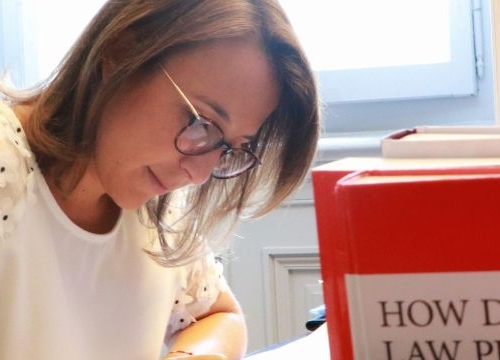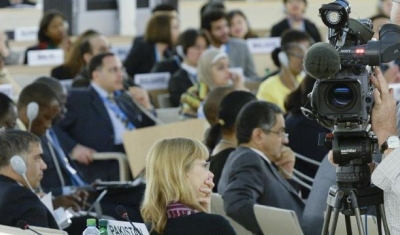Meet our Researchers: Émilie Max


Geneva Academy
20 January 2020
Émilie Max is a former researcher in international humanitarian law (IHL) at the Geneva Academy. She also works as an independent consultant for international NGOs based in the Middle East.
Tell us about you: What’s your Background?
I have a dual background in law (national and international) and Middle-Eastern studies. I have worked with my own government, national and international NGOs, as well as academic institutions. I notably focused on topics such as detention in non-international armed conflicts, accountability for international crimes committed in Syria since March 2011, and the prolonged occupation of the occupied Palestinian territory.
Why Did you Choose to Work in the Field of IHL and Human Rights?
IHL was offered as an optional course during my undergraduate degree and, as cheesy as it sounds, I simply ‘fell in love’ with it. It felt like a breath of fresh air compared to tax law and fed into my longstanding interest for politics, diplomacy and international affairs.
I was originally more interested in the technical intricacies of the law than in its humanitarian dimension. With my first professional experience came the realisation that the law could be used to uphold fundamental values I strongly believed in. I am still in awe that I can be intellectually challenged while also having some, even if the slightest, positive impact.
People I admire, respect, and have a lot to learn from have also influenced my choice of career. I am incredibly thankful to everyone who has believed in and taken a chance on me.
What are the Research Projects you’re Currently Working on?
As a researcher at the Geneva Academy, I am in charge of organizing the so-called ‘IHL Talks’, a series of events (about six-seven per year) aimed a debating contemporary and politically relevant issues of IHL. Past editions have for instance addressed the legal status of foreign fighters and their relatives detained in northeast Syria, starvation in non-international armed conflicts, and the impact of counter-terrorism measures on humanitarian action. They target the diplomatic, academic and practitioners’ community in Geneva.
I am also finalizing research into the role of human rights mechanisms in strengthening respect for IHL. Based on the neutral premise that, whether we like it or not, United Nations (UN) mechanisms and (universal and regional) treaty bodies increasingly tackle issues of IHL, the project aims at examining whether criticism towards such tendency is actually warranted, and at identifying potential avenues for maintaining the integrity of both legal frameworks. It also pinpoints key questions deserving of further research.
I am additionally working on two other projects. One, which is at its very outset, examines how the UN Security Council has dealt with IHL and which role(s) non-permanent members of this organ have played in this regard. The other is dedicated to the human rights responsibilities of armed non-State actors.
Finally, I have used my academic freedom to establish a collaboration with the Geneva branch of ATLAS (a network empowering, supporting and connecting women working in or embarking on a career in international law).
In this framework, I co-organize regular public discussions on women’s perspectives on such a choice of career. The first editions successfully took place in June, September and December 2019, and I look forward to those upcoming in 2020.
Why are these Projects Important? What will be their Impact?
In different ways, each of the above-mentioned projects aims at demystifying preconceived ideas such as IHL’s inaccessibility to an inexperienced audience or armed non-State actors’ unwillingness/incapacity to comply with humanitarian norms. The projects should also contribute to sketching realistic and feasible policy ideas, or, at least, to challenging the status quo.
According to you, what are the Key Challenges today in IHL and Human Rights?
In my opinion, the key challenge lies in upholding the legal achievements of the past 70 years (i.e. since the adoption of the Geneva Conventions in 1949). It is all about demonstrating the continued relevance, and practicability of this legal framework – and of the fundamental values it embodies – in an era increasingly defiant of the international legal order.
It is also essential to continue fostering meaningful and respectful debate between professionals from various backgrounds (political, institutional, etc.). By virtue of its convening power, the Geneva Academy has an important role to play in this regard.
On a More Personal Note: What do you Enjoy doing in your Spare Time?
I am an avid reader and podcast listener, and I adore spending quality time with the people I love, wherever they are.








